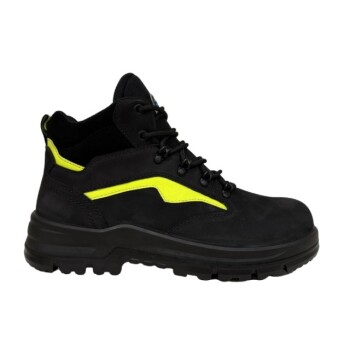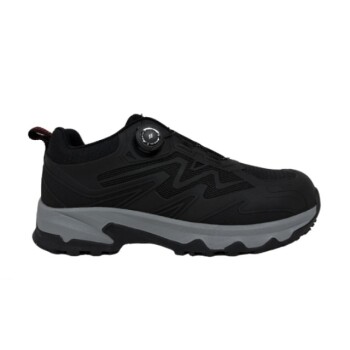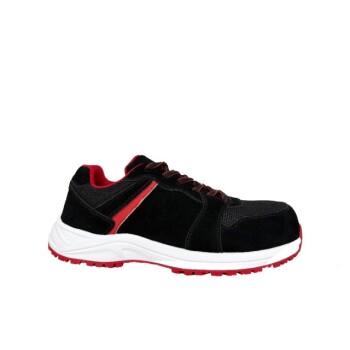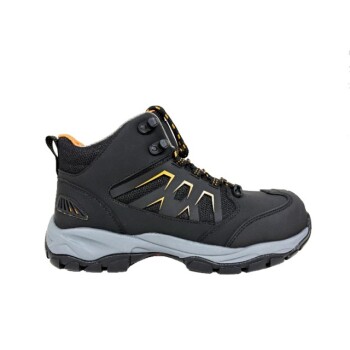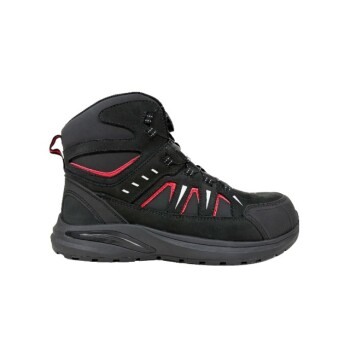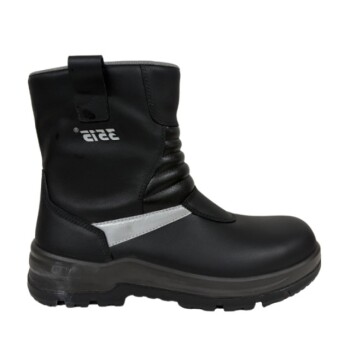To be precise, steel toe caps are typically manufactured from two main types of steel: carbon steel and alloy steel. Carbon steel, a fundamental blend of iron and carbon, serves as the traditional and most common material, while alloy steel incorporates additional elements like chromium or nickel to enhance specific properties like strength and corrosion resistance.
The choice of steel in a safety boot is a deliberate engineering decision that prioritizes maximum impact and compression resistance. However, understanding steel's inherent trade-offs is essential for selecting the right protection for your specific work environment.
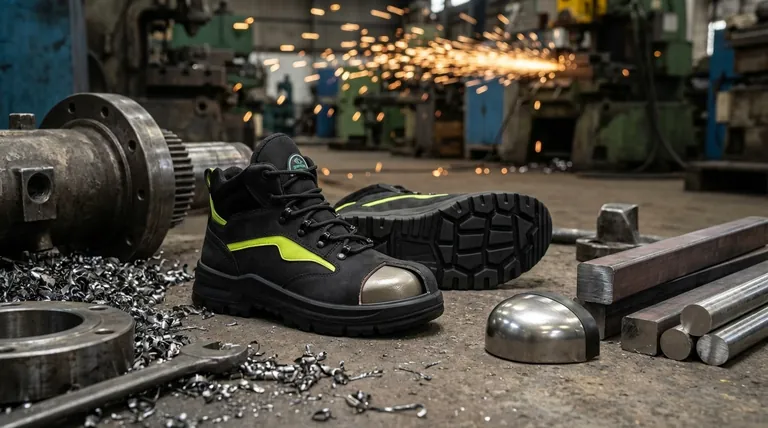
The Core Function of a Steel Toe Cap
A steel toe cap is a rigid, protective reinforcement built into the toe box of a safety boot. Its sole purpose is to shield the wearer's feet from serious injury in hazardous workplaces.
The Role of Carbon Steel
Carbon steel is the foundational material for most steel toe caps. It is an alloy of iron and carbon, often with small amounts of manganese.
Its widespread use is due to its excellent combination of high strength, durability, and cost-effectiveness, making it ideal for mass-produced, reliable safety footwear.
The Advantages of Alloy Steel
Alloy steel represents an enhanced alternative. By adding elements like chromium, nickel, or molybdenum to the iron-carbon mixture, manufacturers can create a material with superior properties.
These additions can increase hardness, toughness, and resistance to corrosion, resulting in a toe cap that can be even stronger or more resilient than standard carbon steel.
Why Steel Remains the Protective Standard
Despite the emergence of alternative materials, steel has remained a trusted standard in safety footwear for decades for several key reasons.
Unmatched Impact Resistance
Steel offers an exceptional degree of protection against impacts from falling or rolling objects. Its rigidity prevents the toe box from deforming under immense force, providing a critical safeguard in industrial and construction environments.
Proven Durability and Reliability
Steel is a time-tested material known for its robustness and longevity. A steel toe cap will not degrade or lose its protective qualities over the life of the boot, ensuring consistent and reliable safety.
Cost-Effectiveness
Compared to more advanced materials like carbon fiber or proprietary composites, steel is generally a more economical option. This allows manufacturers to produce highly protective footwear at a more accessible price point.
Understanding the Trade-offs
While highly effective, steel toe caps have inherent characteristics that make them unsuitable for certain applications. Understanding these trade-offs is crucial for making an informed decision.
Weight and Comfort
Steel is denser and heavier than composite or aluminum alternatives. This added weight can contribute to foot fatigue over a long workday.
Thermal Conductivity
A significant drawback of steel is that it conducts temperature. In cold environments, the toe cap can become very cold, and in hot environments, it can retain heat, impacting comfort.
Electrical and Magnetic Considerations
Being a metal, steel will conduct electricity, making it an unsuitable choice for electricians or those working around live circuits. It will also set off metal detectors and can be problematic in workplaces with powerful magnetic equipment.
Making the Right Choice for Your Work Environment
Selecting the right safety toe material depends entirely on the hazards and requirements of your specific job.
- If your primary focus is maximum protection in heavy industry (construction, manufacturing): The proven, cost-effective strength of a steel toe is often the most reliable choice.
- If your primary focus is working around electrical hazards or in extreme temperatures: A non-conductive and insulating composite toe is the necessary and safer option.
- If your primary focus is all-day comfort and reduced fatigue: A lightweight composite or aluminum alloy toe may be a better fit, provided it meets your site's impact rating requirements.
Ultimately, understanding these material differences empowers you to select safety footwear that provides the right protection without compromise.
Summary Table:
| Steel Type | Key Characteristics | Best For |
|---|---|---|
| Carbon Steel | High strength, durability, cost-effective | General industrial work, construction, manufacturing |
| Alloy Steel | Enhanced strength, corrosion resistance, toughness | Demanding environments requiring superior durability |
Need reliable safety footwear for your team?
As a large-scale manufacturer, 3515 produces a comprehensive range of steel toe and composite safety boots for distributors, brand owners, and bulk clients. We ensure maximum impact protection, durability, and compliance with safety standards.
Let us help you equip your workforce with the right protection. Contact our experts today to discuss your specific needs and get a quote.
Visual Guide
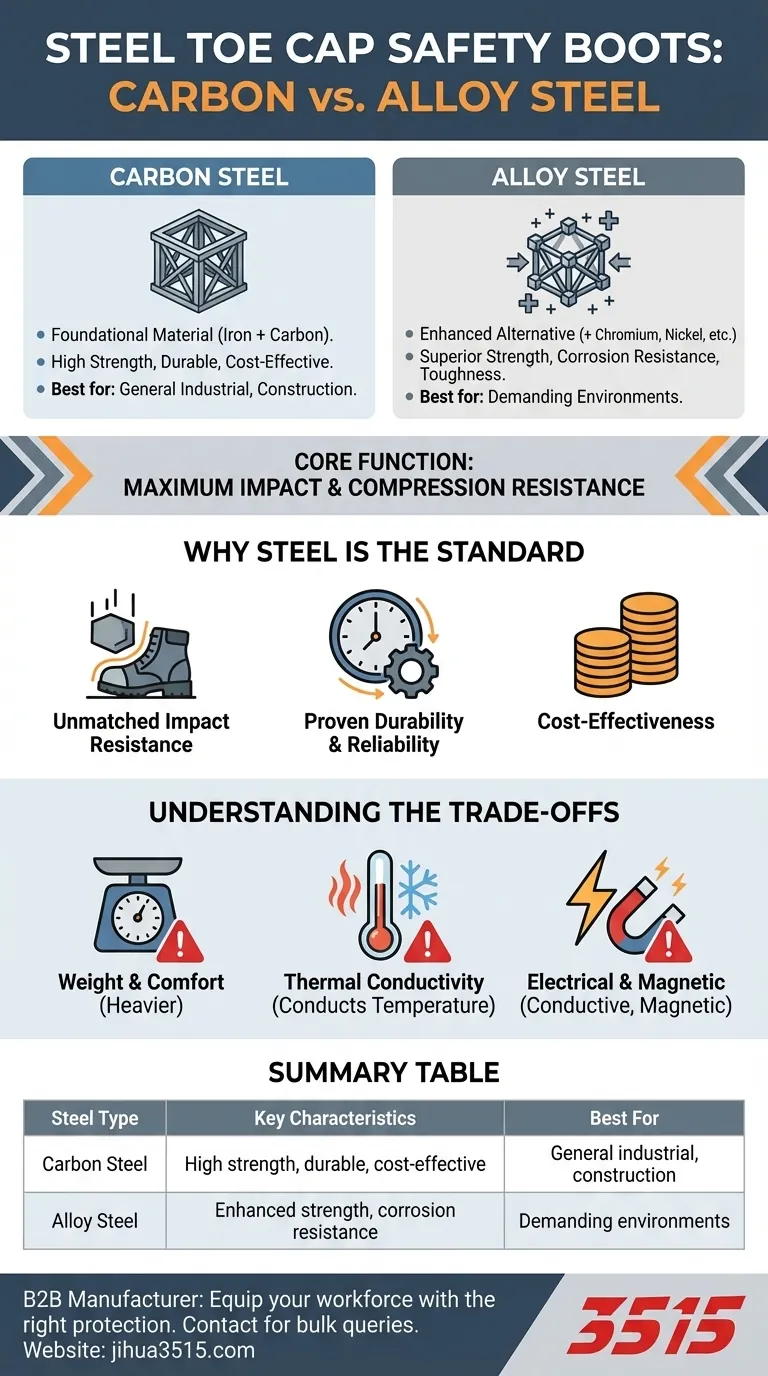
Related Products
- Wholesale Premium Waterproof Nubuck Safety Shoes Boots
- Premium Wholesale Waterproof Safety Boots High Performance Protection for Industrial Markets
- Advanced KPU Athletic Safety Shoe with Steel Toe Cap Anti-Slip Rotary Lacing System
- Premium Suede Sport Safety Shoes for Wholesale & Bulk Orders
- Premium Sport Style Safety Boots for Bulk Orders
People Also Ask
- What are the primary safety functions of safety boots with steel-toe designs? Essential Protection for Industry
- What role do high-sensitivity IoT devices play in footwear material handling? Powering Green Logistics & Efficiency
- What specific protective functions do safety shoes offer during high-risk tasks? Master Safety on Structural Beams
- What are the technical advantages of industrial-grade slip-resistant safety shoes? Prevent Falls with Engineered Grip
- Why is specialized personal protective equipment required for specific industries? Enhancing Safety in Heavy Industry
